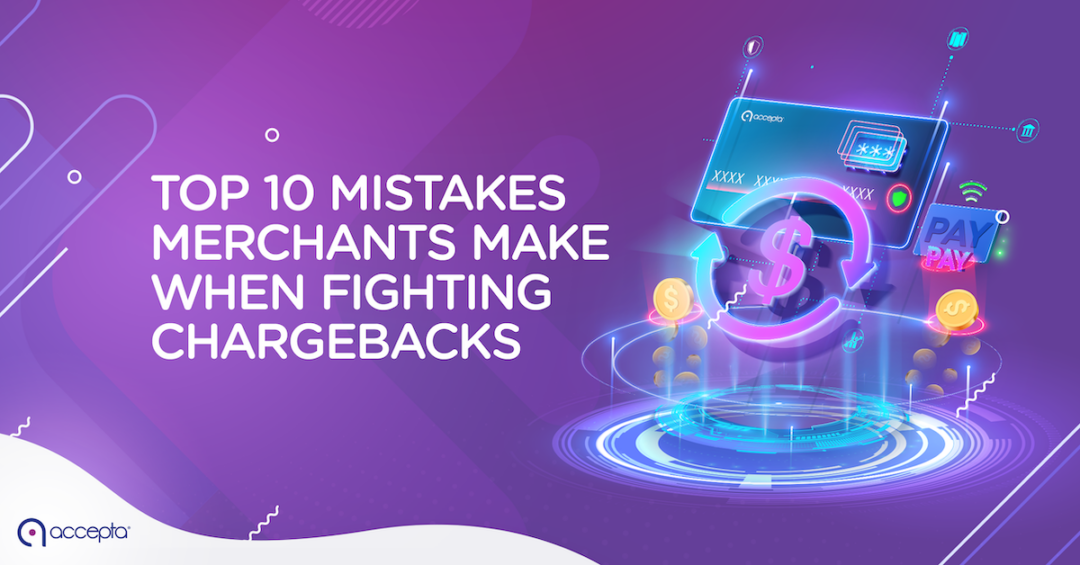Being a merchant comes with many challenges, and one of the most ubiquitous of these is knowing how to handle cash flow and payment collection while keeping disputes to a minimum.
Unfortunately, every business has to deal with complications at some point when it comes to accepting payments from customers. Among these complications are what’s known as chargebacks, which can majorly disrupt your revenue if not properly managed and addressed.
What are chargebacks?
Chargebacks occur when customers dispute a transaction which then leads to the charge amount being returned to the customer (back on the card used) and the business account being debited.
![SL_091019_23190_67 [Converted]](https://acceptapayments.com/wp-content/uploads/2023/04/SL_091019_23190_67-Converted.png)
Typically, there are three types of chargebacks merchants should be aware of:
- Friendly fraud chargebacks: Friendly fraud occurs when a cardholder makes a purchase and files an illegitimate chargeback with their card company, claiming they didn’t initiate the transaction.
- True fraud chargebacks: True fraud occurs when a stolen card or account is used to purchase products or services without the cardholder’s permission. This results in the cardholder filing a charge for unauthorized use of his/her payment information.
- Merchant error chargebacks: Merchant error chargebacks are legitimate claims that can stem from issues involving technical errors, poor customer service, unwanted recurring payments, and more.
While chargebacks can be applied to both credit cards and debit cards for various reasons like fraud and poor product quality, merchants can fight chargebacks if they feel the reason is invalid or misrepresented.
That being said, businesses should be careful about what actions they take to fight chargebacks, as making mistakes is common while handling these disputes and can have adverse effects.
The top 10 mistakes merchants make when fighting chargebacks include…
- Not communicating with customers
- Little or no knowledge of chargeback reason codes
- Failing to fight chargebacks altogether
- Wasting time
- Ignoring fraud trends and red flags
- Expending costs and valuable resources
- Only focusing on winning the dispute
- Not working with your processor
- Failing to collect chargeback metrics
- Neglecting fraud prevention tools
- Not communicating with customers
- Little or no knowledge of chargeback reason codes
- Failing to fight chargebacks altogether
- Wasting Time
- Ignoring fraud trends and red flags
- Expending costs and valuable resources
- Only focusing on winning the dispute
- Chargeback dispute rates:
Poor communication with consumers is one of the biggest mistakes a business can make when trying to prevent, manage, and reduce chargebacks.
Merchants that clearly communicate refund policies with their customers and have easily accessible information on their websites can mitigate or avoid chargebacks altogether. Providing thorough product descriptions and pictures, transaction statements, order details, and more, can also help you fight chargebacks.
To successfully fight a chargeback, it’s beneficial for merchants to have sufficient knowledge of, and be up-to-date on, chargeback reason codes.
Reason codes for chargebacks work as a classification system established by the card networks that consists of the chargeback types, chargeback reasons, and the required evidence needed to dispute the chargeback. This information is important for merchants to understand in order to build a strong defense against these claims during the representment process.
Merchants that fail to investigate or fight chargeback claims are doing their business a great disservice.
While each chargeback is different and not all can be disputed, your business should thoroughly review every claim to make sure it’s accurate. If the chargeback is illegitimate, you’ll need to decide if it’s financially advantageous to fight it.
Time is one of the most valuable resources when running a successful business, and fighting chargebacks is no different.
While it’s highly recommended to investigate chargebacks to see if they’re legitimate and worth fighting, merchants should be cautious of not spending too much time on these claims.
Ignoring red flags involving your customers’ payments and chargebacks, or trends involving fraud can result in a loss in revenue and legal ramifications for your business.
Therefore, it’s important to track payments, keep detailed transaction records, and actively monitor unusual activity and chargeback fraud trends. Merchants can achieve this by routinely reviewing payment analytics to identify any patterns — upticks in dispute frequency or commonly reported reasons— and stay up-to-date on chargeback reason codes.
Overspending and exhausting valuable resources on chargebacks can lead to major operational issues and financial hardship for your business.
According to the Digital Payments in 2021: Opportunities and Chargeback Risks survey, the top two challenges for respondents were a lack of experience with chargeback prevention and a lack of chargeback prevention strategies. When merchants aren’t prepared or knowledgeable enough to prevent or address these disputes, the cost of chargebacks can be very expensive.
While it’s important to analyze and factor in your win rate when fighting chargebacks, this shouldn’t be the only indicator of success for your business.
Chargeback win rates are the number of dispute wins your company achieves divided by the total number of chargebacks you dispute.
Merchants can gain a better picture of their success rate in fighting chargebacks by evaluating other KPIs like dispute rates and ROI:
The dispute rate is the total number of chargebacks a business receives divided by the number of chargebacks they fight. This means if a business has a high win rate but their dispute rate is below 20%, they’re only fighting a minimal amount of their chargebacks and could be missing out on a lot of revenue.

- ROI
Return on investment (ROI) compares the money you invest in fighting chargebacks to the total amount yielded from these disputes. In addition to reviewing ROI for previous chargebacks, businesses can estimate ROI before taking on a chargeback case to determine if the potential revenue from winning the dispute is more than the amount invested to fight it.
![shutterstock_2246763445 [Converted]](https://acceptapayments.com/wp-content/uploads/2023/04/shutterstock_2246763445-Converted.png)
- Not working with your processor
- Failing to collect chargeback metrics
- Neglecting fraud prevention tools
- Address verification service (AVS)
- Card security code verification
- 3-D Secure
- Device fingerprinting
- Fraud blacklists
- Fraud scoring
- Real-time alerts and notifications
Fighting chargebacks is stressful as is, so why make it harder on your business by not working with a team of experts that wants to see you win as well?
Credit card processors are a valuable resource when fighting chargebacks, as they often have a lot of experience and insight into these disputes, technology to prevent and manage them, and support teams to assist you.
Collecting and analyzing chargeback metrics also plays a vital role in developing a strong management process.
You should be actively collecting a variety of metrics like win rates, dispute rates, and ROI (explained above) as you fight chargebacks. Chargeback rates are also important for merchants to track, as they calculate the number of total transactions that result in chargebacks.
Last but not least, businesses should never make the mistake of neglecting fraud prevention tools, as they’re necessary to fight fraudulent chargebacks and other threats.
Here are some common fraud prevention tools that aid in chargeback protection for merchants:
Finding the most robust fraud prevention tools will help your business enhance its payment security and be more prepared to fight against fraudulent chargebacks. Accepta’s payment processing solutions integrate fraud protection tools, providing a strong defense against fraud.
Merchants that avoid the 10 common mistakes included in this article will be better prepared to successfully fight chargebacks and save more time, resources, and money.
For more information on payment processing solutions that help you save, contact us at (787) 774-1555 or visit us at www.accetapayments.com

